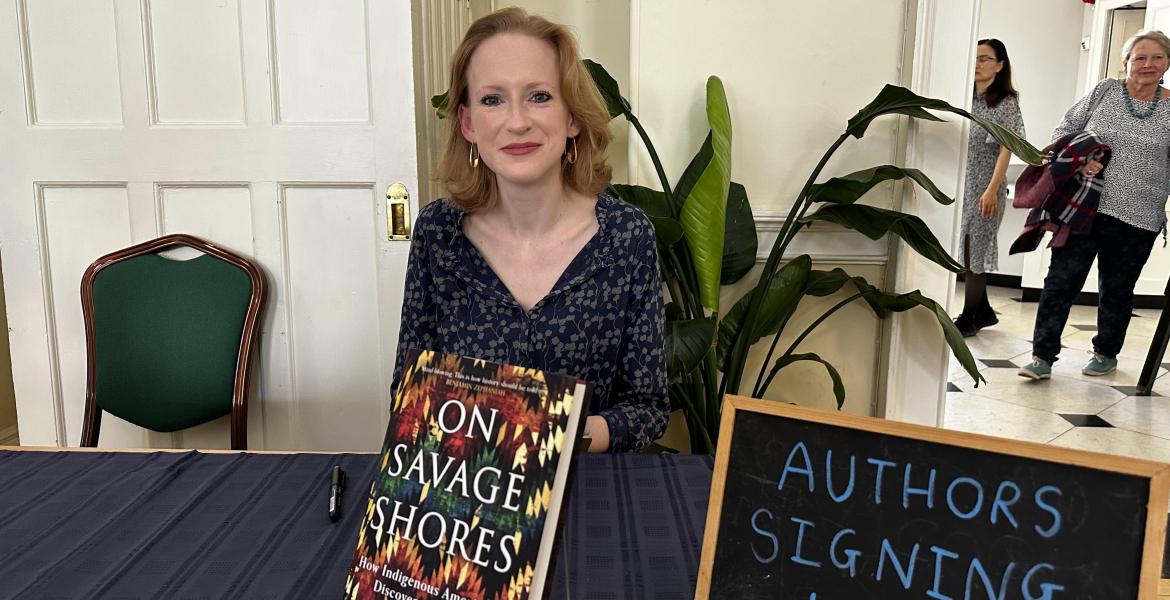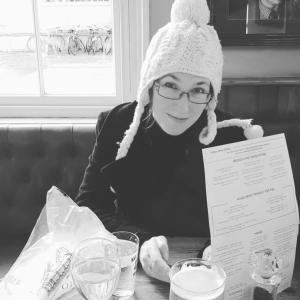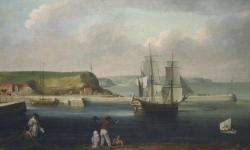Caroline Dodds Pennock: In Conversation
Caroline Dodds Pennock, author, Senior Lecturer in International History at the University of Sheffield and the only British historian of the Aztecs, has been busy touring for her new book, On Savage Shores. We were lucky enough to catch up with her, however, at the historic Garrick's Head, now a fine pub but once the home of the famous eighteenth-century dandy Beau Nash, in the beautiful city of Bath. It was a glorious setting to talk about Caroline's work and the stunning stories she's published in On Savage Shores.
Can you describe your new book, On Savage Shores?
It's trying to flip the script on the traditional picture about the 'discovery' of America, because we so often hear about, frankly, white dudes going west and very little about IndigenousNative to a particular place. people coming the other way. I started off doing quite specialist work about Indigenous Mexicans coming to Spain, and that work went on quite a long time, partly because I had a baby, partly because I had a new job, and so on. But the longer I had with the project and the longer I had for it to marinate, the more I realized there was a much bigger story there about Indigenous people in general and how their mobility has been omitted from that early story of encounter. It's not even that nobody knows about it: I have lots of footnotes – too many for my editor really – that show that people have studied these things before and that descendant communities know about them, but they just haven't made a dent on the popular understanding of that period of history. When the general public – and even scholars – consider that period, often they just don't imagine Indigenous people in Europe. It's not part of their picture.
Why do you think people aren’t familiar with it?
It's a difficult question, because there are so many different aspects to this. One is certainly the erasure of Indigenous peoples from history at various times in order to create triumphalist narratives of white discovery. I just finished reading Ned Blackhawk’s amazing new book, The Rediscovery of America, and he shows so clearly how if you tell the story of the Americas with Indigenous people as protagonists, as they always should have been, it tells it differently. When we think about, for example, the American Revolution, we think of 'No taxation without representation'. That's the narrativeA story; in the writing of history it usually describes an approach that favours story over analysis.: the East Coast, the cities. But actually the majority of people in that period are living in the Midwest and in the centre of America and the Great Plains. And what he shows is that for people living in those regions, what they care about is land – they're really worried that the Crown supports Indigenous claims to the land. So the people who are the 'anti-Indian' gangs that roam around committing violence against Indigenous people, stealing their lands, murdering at random, become the militias that then fight the British because they think that the Crown is the supporter of the Indigenous people. There's this whole story that we don't really think about that has so totally reframed that period of history. Indigenous people often get deliberately told out of national narratives of discovery, of conquest, of triumph.
I think there's also the fact that until relatively recently, even scholars saw Indigenous peoples as tied to the land. They were seen as terrestrial, as having deep connections to the land – which they do – but people didn't think about them as travellers, as sailors. Andrew Lipman has a wonderful book called The Saltwater Frontier that shows Indigenous people as sailors but again it just isn't in the popular imagination. The deep narratives, like that ‘In 1492 Columbus sailed the ocean blue’, are very powerful. They serve purposes.
But I don't think there is a deliberate rewriting of history, it’s just that most people don't know about it. Indigenous peoples haven't made their way into popular histories and film. People like David Olusoga, Olivette Otele, Imtiaz Habib are doing great work now, putting Black people back into our perception of history, and things like Bridgerton are re-imagining it with people of colour. But there are films that show the Second World WarA global war that lasted from 1939 until 1945., for example, that don't show the colonial troops. It's all these small things where people just haven't been made aware that it’s not just white people who are mobile.
Your book has prompted some quite emotional responses.
I think that at the moment there is a culture war being fought in which the reclamation of empire, and the preserving of a kind of idealized version of the past, is part of promoting a specific agenda. I think that people are uncomfortable with the idea that we might foreground Indigenous voices or accept that these colonial histories have long legacies. It is not the same thing as white guilt: you don't have to be guilty in order to recognize that you maybe have a responsibility to help redress issues that are the result of a long history of inequality. It's not the same as feeling guilty, and those two things often get blurred. The separation of guilt and of responsibility is for me a helpful distinction.
My book has a foreword about language, which in the US is standard practice: everybody has a positional statement where they explain who they are and where they’re coming from. I think it is really important to frame the work and to be clear, especially because it's being published in the US, almost at the same time with the same text. Here, though, I do wonder if there have been a few cases where people have gone, 'Oh, that means it's "woke"', and people maybe have been alienated. But there's so much in there that would be of interest to a wide audience. For example, the Daily Mail reviewed it and included about 20 paragraphs of them saying, 'Aren't these stories cool?', and then there are two paragraphs saying, 'She is a bit tiresomely one-sided about empire'. So mostly it was quite positive. And that's the thing: there are stories here that change the wider perception of history and that should reach beyond the demographic that’s labelled as 'woke'.
There will always be reasonable critiques of books. However good the book is, there will be something you could have done differently or could have done better, or didn't think of or weren't aware of. I keep finding more examples now and thinking, ‘Why didn't I put it in?’ But of course, you can't use every single example. The one I'm cross about was Garcilaso de la Vega, who is a famous mestizo – mixed heritage – scholar who comes from the Americas to Spain. I had a paragraph about him because he's so famous, but the point of the book is not to talk about famous people, and instead to show the wider movement. So somewhere in the editing, this one paragraph got lost. But one reviewer complained that I didn’t mention him. It was not a bad review, but he criticised me both for talking too much about famous people and for not talking enough about famous people. It did make me laugh. But that's writing a book: you put it out into the world and people critique it, and sometimes that hurts, but you have to just take it on the chin or brush it off or respond to it.
Sometimes it's a preference: one person said she would have preferred if I'd used 'maybe' and 'perhaps' less. But I personally feel that I can't ventriloquize for my Indigenous subjects. I have to say when I'm speculating. If an Indigenous descendant wants to write a history that imagines themselves into that place and how those people might have felt, that's their prerogativeA right or privilege exclusive to a particular person or group.. It's not for me as a historian to do that. I can say based on my expertise, 'I think maybe this', but I have to use the 'maybe': I feel that's really important.
As a white woman I don't take lightly being the person to bring these views to a wider audience. I see my role as more to draw attention to this, to say how important these histories are, to show what their legacies are, and to try to point to other Indigenous voices and writers and scholars and histories that speak to this, and to say, 'This is just the doorway to a much wider, fascinating, important global history.' All you can do is to try to be very clear about the limitations of your position and to try and use that platform in a positive way if you're fortunate enough to get it.
Is there a big network of people, of academics, across Central America with whom you collaborate on a regular basis?
I can't pretend that this book is a product of deep community work. It certainly isn't, because it covers such a wide range of peoples. I can't pretend to speak for any one community because it covers everything from the Caribbean to the InuitA group of culturally similar Indigenous peoples inhabiting the Arctic and subarctic regions of Greenland, Labrador, Quebec, Nunavut, the Northwest Territories, and Alaska., the TupiMembers of any of several related Indigenous peoples living in and around the Amazon basin. and the MexicaA Nahuatl-speaking people of the Valley of Mexico.. It's an enormous breadth of stuff. What I did do, though, was to consult with Indigenous colleagues and also authors and people I know and ask them to read the book and try to get their opinion. My friend and co-author Leila Blackbird, who authored with me on What Is History Now?, was amazing. She read every single word of the book and pointed out things that I would never even have thought of, where I might be being insensitive. So she mentioned, for example, that I'd used the idea of Indigenous people being part of the landscape, which implies they're naturalistic – too often they're seen as part of the wilderness. It was just a metaphor – I'd never even thought of it like that – but she's right: I was replicating a trope about Indigenous people without even noticing.
Why do you think there is this interest in Indigenous peoples?
It's difficult, isn't it? Because sometimes that interest is voyeuristic: it's all, 'They're not like us; aren't they curious?!' So you have to be very careful not to replicate that. For me, I think it is just that it's new. It's something people have no idea how important and fundamental and prominent this is because they've been sold a picture of Indigenous people who are either a barbaric, brutal peoples who commit human sacrifice, or naive people living in the wilderness, who are nomadic and live lightly on the land. They just aren't aware of the complexity of these cultures, and when they do hear about it, they're fascinated how different it is to their perception, and how important it is as well to contemporarySomeone or something living or occurring at the same time. history. We make an assumption that people know that chocolate and potatoes and tomatoes are from the Americas, but chillies weren't in India or part of Asian cooking in many areas until the nineteenth century, and certainly not until after 1492. But people just don't know that language and food and things go back so long. We've been sold a story in the UK that migrationThe movement of people (or animals) from one place to another. on a mass scale starts with Windrush and the 1950s, but it's so much deeper than that. People genuinely are fascinated by how this speaks to the world we live in today, as well as it's just really interesting. These histories are something people haven't heard, and there is an element of novelty to that.
I know you've written a lot on Mexican religious practices. Are there any things that you want to correct about these stereotypes?
Well, my specialism is Aztec history – we know them as the Aztecs, but they would have called themselves Mexica or Tenochca – and they are seen as this barbaric culture: bloodthirsty committers of human sacrifice, people who rip people's hearts out. So I do want to correct, or at least nuance, that. It's not that they did not commit human sacrifice, although it is certainly exaggerated by the Spanish in order to justify invasion, but why do we treat this form of religious violence as different from any other? Why don't we see it as similar to witch trials or auto-da-féThe ritual of public penance - including death by burning - of condemned heretics, imposed by the Inquisition.? We are familiar with the idea that people today kill and die for religion. Why is it that this one culture, one community, is seen as so alien for doing so? I've seen comparisons with the Nazis and phrases like ‘killing on an industrial scale’, which just perpetuate that myth. These are people who believe that if they don't let blood, the world will come to an end. They're not doing it for personal gain. There are political framings around it, but it's part of warfare and it's part of religion. In the medieval era, hundreds of thousands of people died in the Crusades, but we don't demonize their entire society as a result, whereas we do for the Mexica people.
These are people who loved to sing and dance. They have more egalitarian gender roles than any European culture at that time: you can get divorced, you can't beat your wife, you have universal schooling for boys and girls. It's the only pre-modern culture that I'm aware of to do that. And this actually is why I think sometimes people are so fascinated by these histories: it makes them stop and think.
So for me, those are the kinds of religious stereotypes that I think it's so important to challenge, because they are being used to justify the oppression of Indigenous peoples now as well as in the sixteenth century. If I talk about the Mexica people on Twitter, someone always pops up to say, 'Well, at least we got rid of human sacrifice!' There are real contemporary debates, not just in Britain, but in Spain and in the US and other places where there's an ongoing justification of certain people having power over lands, over rights, over water. There's still a huge issue. Indigenous people today are more likely to have lower life expectancies, be poorer, have higher infant mortality rates, be much more likely to have their children taken away by the social services, be more likely to be killed by the police in the United States than any other group – including African Americans. Women are much more likely to be murdered; you may have heard of the Missing and Murdered Indigenous Women campaign. These are problems within communities as well as caused by structural factors, but the fact that there is structural disadvantage speaks to a long history of oppression and a lack of recognition of rights. That's something that Ned's book talks about wonderfully. The DoctrineThe set of beliefs upheld by a religion or political party. of Discovery, the idea that someone 'discovers' your land, which you're not really 'using' in a Western sense, and they're allowed to have it, was put into US law in the nineteenth century, having come from a papal bull in 1493 for the Americas – it's earlier than that for Africa. The Pope actually, finally, after decades of campaigning by Indigenous people, renounced the Doctrine of Discovery earlier this year. But it's still in US law.
The task of researching the book must have been immense.
This is why there are 15 years between my last book and this book! I'm hoping there won't be as long until the next one. Stopping at the founding of Jamestown does give you a finite period, and a lot of it is Spanish and Spanish American because that is my specialism. But it's also that most of the encounters are with Spain in that period. There are Indigenous people in Britain: there's the Brazilian king at the court of Henry VIII, for example, which is an incredible, fascinating story. And you do have some in the Lowlands, some from Portugal, but a lot of it is Spain and Northern France.
Are you quite the linguist?
I am an enthusiastic but untalented linguist! I read Spanish well, and Nahuatl. For the book I had to engage with texts in huge numbers of languages: French, Portuguese, German, Latin, Dutch. The Tupi texts that I used, fortunately, had been recently translated by expert scholars into Portuguese, but not into English. I have to work at it, but I went back to the primary sources wherever I possibly could. Although, because of COVID, I often was reliant on facsimiles online, so a lot of it is printed primary sources, but I did a fair bit of Spanish archival work. The work that people have done to make these sources more available is incredible.
How did you get into Aztec history in the first place?
It's a very boring origin story where I was just really interested in history when I was younger and I read lots of things about non-British, non-European history, thanks to a history teacher I had: he gave me books about things like the Assyrians, and I was really fascinated by it. I love history generally, but this particular point in history is a period when we see a culture like the Mexica, who people think of as being an ancient society, meeting a society that's contemporary with Henry VIII. It's much closer in time than you think: people pigeonhole the Aztecs with the Egyptians and the Romans, but actually it's much more recent. So there was something about that juxtaposition that fascinated me. Then I went to university and did a dissertation on it in the teeth of the advice of my supervisor and just carried on.
So, what are your next projects?
I have a bid in that I am keeping my fingers crossed for, and if we're successful, we'll get big European funding, which will bring no money to the UK because of Brexit: where it would have brought €2 million to Sheffield, now it will bring zero money to Sheffield. Instead I will be employed in Paris. It's a €10 million collaborativeProduced by or involving two or more parties working together. project about why people entangle the ideas of religion and violence and how we need to disentangle the stereotypes. I'll be working with amazing colleagues and also cartoonists to produce a series of comic books that speak to the histories. But it's about a 15 per cent chance we'll get it even though we're through the first round, as we bid against scientists. I've also got some more things about Indigenous travellers that I want to write about, who are in the century after and didn't quite fit in the book, and I would like to do another trade book, but I'm not certain enough to talk about it yet.
If you had a safety bubble and you could go back in time to any particular point or place in history, where would you go?
I would see what happened between MoctezumaThe ninth emperor of the Aztecs. and Hernando CortésA Spanish conquistador who led an expedition that caused the fall of the Aztec Empire and brought large portions of its land under the rule of the king of Castile., because the sources have a huge argument about it. Cortés says that he's been in the city of Tenochtitlan, the Aztec capital, for about a week, and then he kidnaps Moctezuma and uses him as a puppet ruler for months. The Indigenous sources say it's much later, and that the Spanish murdered Moctezuma; whereas the Spanish sources say Moctezuma was killed by his own people. I find it very unlikely that you could have been surrounded by very effective, energetic senior warriors for months and have a ruler who was saying, 'No, no more human sacrifices.' It can't have happened like that, but we don't know exactly how it did happen. We do know that at some point Cortés takes Moctezuma prisoner. My suspicion is that it's very close to the end of their time in the city. Cortés implies it's very close to the beginning. What happens in that period and with Moctezuma’s death is something we are never going to be able to answer with the available sources.
If language were no barrier at all and you could transport people Bill-and-Ted-style to a dinner party, who would you have?
That's a tricky question! Malintzin, who was Cortés’s translator. She died when she was very young, but she appears all through the conquest and just after, although we have no words recorded by her. So she's become this famous figure in history, sometimes known as La Malinche or Doña Marina, and is emblematic as either the mother of the mestizo nation or the symbol of betrayal. But we know so little about her. Off the top of my head, she's the one that I would like. I would like to ask Moctezuma or Cortés what happened; they might just tell me. Moctezuma, rather than Cortés, probably because we know what Cortés says happened. I'd like to know what Moctezuma says, but I'm not sure he was a very nice man. He had a lot of wives and a lot of power, and those kinds of men are normally not very good company. My other suggestions are being framed entirely by which You're Dead to Me podcast I've listened to lately, because they always tell you about the people who are funny or interesting! Oscar Wilde would probably be a good dinner guest. There's the abolitionist who was enslaved then freed, Frederick Douglass, who was apparently really, really funny as well as being incredible and interesting and educated. Also, Leonardo da Vinci.
You can buy On Savage Shores here.
- Log in to post comments






